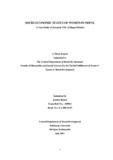Please use this identifier to cite or link to this item:
https://elibrary.tucl.edu.np/handle/123456789/2348| Title: | Socio-Economic Status of Women in Nepal: A Case Study of Juropani VDC of Jhapa District |
| Authors: | Basnet, Januka |
| Keywords: | Women identity;Socio-economic condition;Women;Jhapa |
| Issue Date: | Jul-2011 |
| Publisher: | Central Department of Rural Development Tribhuvan University, Kathmandu |
| Abstract: | The socio-economic status of women means the status of women in socio-economic view point. The social status describes about demographic characteristics, caste and ethnicity, religion, family structure, marriage pattern etc. Similarly the economic status describes level of income, source of income, employment, income generating activities and so on. All these factors affect in the development of human beings. If any family is suffering through weak social and economic status then the family has to face many difficulties to get opportunities. Even in case of women, they have a high social status but they may not have rights for self decision making and economic opportunities. The study tries to reflect the actual social and economic status of women of Juropani VDC, Ward no.1 located in Jhapa district, has been selected as the study area because the village has the population with multi ethnic and multi cultural groups. In Juropani VDC, the total population is 11254 and that of the Ward no. 1 is 1309 where 673 are male and 636 are female in 211 households (Juropani VDC, 2003). Among the 636 females, 40were selected for the study on random sampling basis, the major profession of the women is agriculture. Some women were found involving in small business, service and wage labour etc. This study has been analysis “socio-economic status of women” in Juropani Village Development committee, Ward no. 1, Jhapa. Both married and unmarried women ages of 16 to 60 years were interviewed through simple random sampling. The objectives of the present study were to find out the socio-economic condition of the women in the study area like social aspect, caste and ethnicity, religion, education, marital status, family structure, position in the family, work load, economic aspects, occupation, size of land holding, food sufficiency, livestock, income sources, personal property, decision making process, health status potential problems of women and suggestions to improve their condition of social and economical status and so on. The decision making process indicates one’s status in his/her family. In the study area the decision making power of the women was found major in some sectors such as buying/selling of agricultural products, cooking, forming, celebrating festivals and schooling children. But in case of buying/selling of land, households, cattle, arranging marriage, medical treatment and the women’s role was found minor. In case of health sector, the study area was found getting facilities of health post and herb practitioners. However man and women are assumed two wheel of a cart, the women have been behaved as second-class people, but it is not true in practice. The government Political parties, NGOs and INGOs should bring their commitment for uplift of women in social, economic and personal freedom. The government should make amendment in many current policies and laws to ensure the women’s rights in different sectors such as education, employment, health etc. in employment certain percentage of seats should be reserved for women. Similarly the political parties should increase women’s active participation in policy level, central level etc. on other hand all the women should be capable to accept all challenges confronting in the way of their development. |
| URI: | http://elibrary.tucl.edu.np/handle/123456789/2348 |
| Appears in Collections: | Rural Development |
Files in This Item:
| File | Description | Size | Format | |
|---|---|---|---|---|
| Thesis2011.pdf | 764.58 kB | Adobe PDF |  View/Open |
Items in DSpace are protected by copyright, with all rights reserved, unless otherwise indicated.
